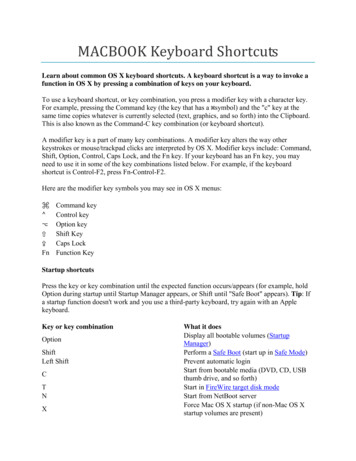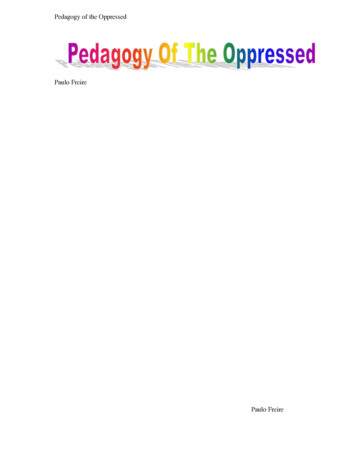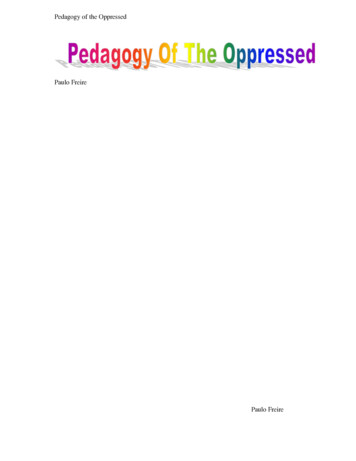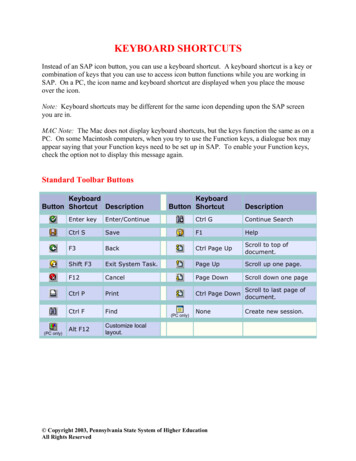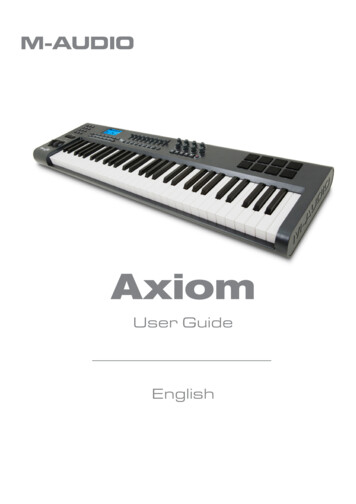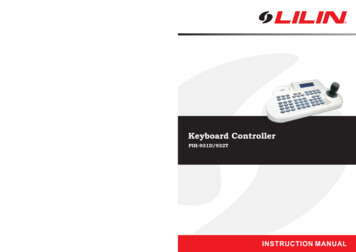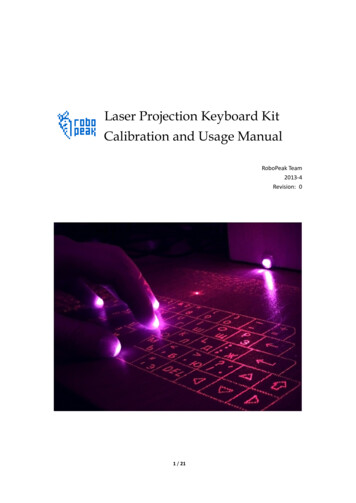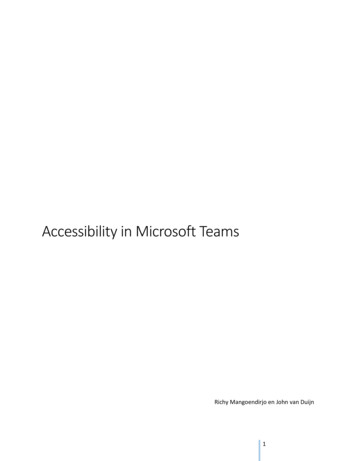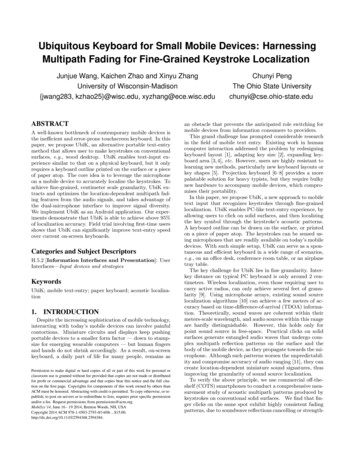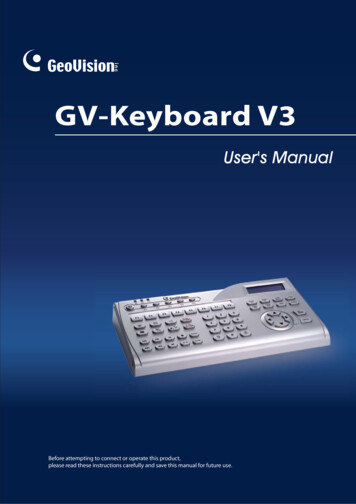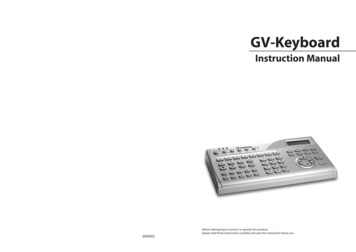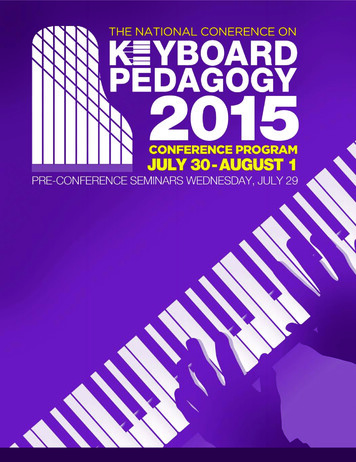
Transcription
National Conference on Keyboard PedagogyTable of Contents02Welcome03Photos from past conferences04Fast facts05Facility map06Special guests08Celebrating the Legacies of Guy Duckworth and Louise Goss10About Frances Clark Center for Keyboard Pedagogy12Donors and support14Pre-conference seminars24Thursday, July 3029Jason Zhu solo recital30John Perry solo recital32Friday, July 3136Sean Chen solo recital37PEDxv programs38Saturday, August 142Presenter Bios52Banquet information54College Row56NCKP acknowledgements58NCKP committee59Conference exhibitors
National Conference on Keyboard PedagogyWelcomeScott Price,President, Boardof TrusteesSam Holland,Executive DirectorRyan Greene,Associate DirectorNatalie Grimes,Advertising Director2On behalf of the Frances Clark Center for Keyboard Pedagogy, we wishyou a warm welcome to Chicago, and to the 2015 National Conference onKeyboard Pedagogy!The Frances Clark Center has been hard at work for the past two yearsto bring you a stellar slate of nationally and internationally recognizedpresenters and performers who will share ideas, insights, and inspiration onall facets of the music teaching profession.Included in the many special events planned for the next few daysare seven pre-conference seminars including technology, creativity, andteaching students with special needs. New this year are special lab sessionswhere attendees may interact with presenters one-to-one. PEDxv willinclude inspiring talks on music in action in our communities, and a specialbanquet will be held in honor of Ingrid Clarfield Jacobsen and DennisAlexander and their many and invaluable contributions to the musicteaching profession.But, this conference is never complete without you! It is your experienceand knowledge that bring us full-circle in our mission to support musicstudy. Teachers and music lovers from around the USA and the world willjoin you in a celebration of your dedication, and the unique and invaluableservice you provide in the lives of students, families and friends, neighbors,and communities.We at the Frances Clark Center for Keyboard Pedagogy are inspired byyou, the teacher, and know that you in turn will be inspired by the sharingof music making and teaching that will be present in abundance throughoutthe next few days.Thank you for joining us, and for continuing to inspire us with the workyou do each and every day.Scott Price, D.M.A, PresidentFrances Clark Center for Keyboard Pedagogy
Fast FactsRegistration HoursWednesday, July 299:00 AM—7:00 PMThursday, July 307:00 AM—7:00 PMFriday, July 317:00 AM—5:00 PMSaturday, August 17:30 AM—12:30 PMPublisher ShowcasesThursday, July 308:00—8:50 AM,5:00—5:50 PMFriday, July 318:00—8:50 AM,5:00—5:50 PMSaturday, August 18:00—8:50 AMExhibit HallThursday, July 309:00 AM—6:30 PMFriday, July 319:00 AM—6:30 PMSaturday, August 19:00 AM—1:30 PMRestaurantsInside The Westin HotelHoly Mackerell!Combining fresh seafood,fresh cocktails and freshdesign, the Holy Mackerel! menu reflects freshinterpretations of fishhouse classics andis printed daily to offeronly the best and freshestseafood available. Theextensive breakfast menufeatures an array of omelets, pancakes and freshfruit smoothies.Harry Caray’s ItalianSteakhouseNamed “Best Steakhouse” by the ChicagoTribune Dining Poll,Best of Citysearch Polland Metromix on CLTV,Harry’s menu features thefinest USDA prime, agedsteaks and chops andItalian favorites.At The Shops onButterfield(short 5 to 10 minutewalk from the Westin)Egg Harbor CafeKerry’s Grill RoomNori Sushi & RamenNoodle BarFlat Top GrillAmrand’s PizzeriaVictory TapBrio Tuscan GrilleNoodles & CompanyRa Sushi BarBucca di BeppoTom & Eddie’sD.O.C. Wine BarPanda ExpressBeer House ChicagoSubwayFor a complete listing visit www.yorktowncenter.com/dineParkingParking is free at the Westin, whether you are aguest of the hotel or not. The only charge for parkingis if you choose to use the valet parking services.4SightseeingThe Westin offers a free shuttle to the LombardMetra Station, where you can catch a train intodowntown Chicago.
Conference MapThe Westin Lombard Yorktown CenterNCKP 2015 Program 5
National Conference on Keyboard PedagogyFeatured GuestsKeynote Address: Beyond the KeyboardEdwin E. GordonThursday, July 30, 9:20-10:20 AMEdwin E. Gordon and his work have been portrayed nationally onthe NBC Today Show, in the New York Times, and in USA Today. Heis widely known as a researcher, teacher, author, editor, and lecturer.Through extensive research, Dr. Gordon has made major contributionsin the study of music aptitudes, audiation, music learning theory, tonaland rhythm patterns, and music development in infants and very youngchildren. He is the author of six highly regarded music aptitude tests,numerous books, articles, research monographs, and is founder of theGordon Institute for Music Learning (GIML).“Readiness to learn to play piano is a significant factor contributing tosuccess. Beginning students learn as much away from the keyboard asthey do when using the keyboard.” – E. Gordon. In his keynote addressDr. Gordon will present preparatory concepts and skills for students insequential order from listening to reading music notation.Conference Artist Solo RecitalSean ChenFriday, July 31, 8:30 PMPianist Sean Chen is being hailed as a rising star with a “million-voltsmile” and a “formidable set of fingers” (Dallas Morning News).In 2013 Chen won the American Pianists Association’s DeHaan ClassicalFellowship, one of the most lucrative and significant prizes available toan American pianist. He also won Third Prize at the 14th Van CliburnInternational Piano Competition, becoming the first American to reachthe finals since 1997. The 26-year-old American pianist has appeared assoloist with the Indianapolis Symphony Orchestra, Fort WorthSymphony Orchestra, Indianapolis Chamber Orchestra,Corpus Christi, New West, Phoenix, and San Diego symphonyorchestras, and the Suwon City Philharmonic in South Korea.Chen received his Artist Diploma at the Yale School of Music in 2014as a George W. Miles Fellowship recipient, and a student of HungKuan Chen and Tema Blackstone. His former teachers include JeromeLowenthal, Matti Raekallio, and Edward Francis. He has been featuredin a nationally syndicated radio series that chronicled the finals weekof the APA’s competition, as well as on From the Top, American PublicMedia’s Performance Today, WQXR (New York), WFMT (Chicago),WGBH (Boston), and WFYI (Indianapolis).6
A Conversation with Jane ChuJane ChuFriday, July 31, 10:00 AMJane Chu was confirmed by the U.S. Senate in June 2014 as the 11th chairmanof the National Endowment for the Arts. Since 2006, Chu served as thepresident and CEO of the Kauffman Center for the Performing Arts inKansas City, Missouri, overseeing a 413-million campaign to build thecenter. As the performance home of the Kansas City Ballet, Kansas CitySymphony, and Lyric Opera of Kansas City, the Kauffman Center has hostedmore than one million people from all 50 states and countries throughoutthe world since its opening in September 2011.Chu was born in Shawnee, Oklahoma, but was raised in Arkadelphia,Arkansas, the daughter of Chinese immigrants. She studied music growingup, eventually receiving bachelor’s degrees in piano performance and musiceducation from Ouachita Baptist University and master’s degrees in musicand piano pedagogy from Southern Methodist University. Additionally,Chu holds a master’s degree in business administration from RockhurstUniversity and a Ph.D. in philanthropic studies from Indiana University, aswell as an honorary doctorate in music from the University ofMissouri-Kansas City Conservatory of Music and Dance.Solo Recital and MasterclassJohn PerryRecital, Thursday, July 30, 12:15 PMMasterclass, Thursday, July 30, 3:15 PMJohn Perry, distinguished artist and teacher, earned his bachelor’s and master’sdegrees at the Eastman School of Music where he was a student of CecileGenhart. Recipient of a Fulbright Scholarship, he continued studies in Europefor four years where he worked with Wladyslav Kedra at the Akademie fürMusik in Vienna, and Carlo Zecchi at the Santa Cecilia Academy of Music inRome. He is professor at the Glenn Gould School of the Royal Conservatory ofMusic in Toronto, professor of piano at California State University-Northridge,visiting artist faculty at Boston University, Professor Emeritus of the USCThornton School of Music, and is artistic director at Southern CaliforniaMusic Institute, which he founded. Perry has won many awards, including thehighest prizes in both the Busoni and Viotti international piano competitionsin Italy and special honors at the Marguerite Long International Competitionin Paris. He has performed throughout North America and Europe with someof the finest musicians in the world. He counts four students as winners of theMTNA National Student Competitions. His recordings are available on theTelefunken, Musical Heritage Society, CBC, ACA and Fox labels.NCKP 2015 Program 7
National Conference on Keyboard PedagogyCelebrating the Legacies ofGuy Duckworth and Louise Goss10:20a-11:00a, Thursday, July 30, Grand Ballroom EFGail Berenson, Sylvia Coats, Ivan Frazier, Judith Jain, Rebecca ShockleyBallet from Orphée et EurydiceChristoph Willibald Gluck (Arr. by Greg Anderson)Gail Berenson and Rebecca Shockley, pianistsGuy DuckworthDr. Guy Duckworth, a pioneerof group piano pedagogy, diedJanuary 27, 2015, at the age of91. He created and directed theunique graduate programs at theUniversity of Colorado at Boulderin Piano Performance Literatureand Pedagogy: Process of GroupEnvironments. Guy’s vision came tofruition at Colorado where students’musical growth and personalgrowth developed hand in hand.He stressed the wedding of affectiveand cognitive understanding of themusic. Following is an excerpt froman article in Clavier Companion(July/August 2015) about his legacyauthored by Sylvia Coats.Guy taught us about the gestalt,that the whole is more than theGuy considered eachlesson “unknownterritory, an openslate,” but with theexpectation thateach student couldhave an aha momentof discovery.8sum of its parts. A beautifulperformance is not justthe result of a correctreading of the score, butan understanding of themeaning of the music. Guyexpected us to make themusic come alive and to beemotionally invested in ourplaying. . .Guy considered eachlesson “unknown territory,an open slate,” but with theexpectation that each studentcould have an aha momentof discovery. He workedhard to make it a possibilityfor each individual in thegroup. Because of the supportive,musical environment that Guyfacilitated, students often describedaha moments when their playing felteffortless with complete involvementin the music. . .His curriculum was organizedby eleven musical, keyboard, andaesthetic concepts, whereby patternscould be observed regardingtechnical, musical, and expressivecontent and principles could bedrawn about the music that aretransferable to other repertoire . . .Guy’s life was one of growth. Theamalgamation of his experiencegrowing up in Burbank, CA,serving in World War II, touringas a performing artist, studyingat Teacher’s College, ColumbiaUniversity, teaching music atTranquility Union High School,CA, the University of Minnesota,and Northwestern University ledhim to create a graduate programat Colorado University unlike anyseen before or after his tenure there,documented in a media presentationtitled, The Person First and Together(1984). Tribute by Sylvia Coats.
Louise GossThe professional contributionsof eminent American pianopedagogue Louise Goss(1926-2014) are countless.Her tireless efforts, along withthose of Frances Clark, includethe establishment of arguablythe first piano pedagogyprogram in the United Statesat Kalamazoo College inMichigan, the creation of theNew School for Music Study,the development of The MusicTree and the Frances ClarkLibrary for Piano Study, theCompanion magazines, and theeditorship of books and articleson piano pedagogy.Goss’s work touched the livesof innumerable piano students,piano pedagogy interns, andpiano teachers. “I would saythat my mission in life hasbeen to do everything [I] canto improve piano teachingmethods and materials, so thatevery child who takes pianolessons can have a wonderful,joyful, growthful experience,”stated Goss. But it was not inGoss’s nature to seek publicrecognition for her work, asMarvin Blickenstaffcorroborates: “Louise[was] not one to covetthe spotlight andwillingly relinquishedthat position.”When asked abouther hopes and wishesfor the future of thepiano pedagogyprofession, Goss stated:“My hope for thefuture is that a muchlarger group of peoplewill come to see what pianopedagogy in its fullness means;how exciting it is, how importantit is, and that lots of people willget on the bandwagon and makeit become what it can become [I hope]everybody [will] beginto grasp this notion that it’s thechild first, music second, andonly third is the piano.” Tributeby Judith Jain.My hope for thefuture is that a muchlarger group of peoplewill come to see whatpiano pedagogy in itsfullness means.presentation of countlessworkshops, the creation ofthe Frances Clark Centerfor Keyboard Pedagogy, theproliferation of the NationalConference for PianoPedagogy and its continuationas the National Conferencefor Keyboard Pedagogy, thepublication of KeyboardCompanion and later ClavierNCKP 2015 Program 9
National Conference on Keyboard PedagogyAbout the Frances Clark CenterVisionThe Frances Clark Center for Keyboard Pedagogy is aleading provider of resources for music education atthe piano with an emphasis on teacher preparation,cooperation, innovation, and advocacy.MissionAs a leading resource for music teachers worldwide, theFrances Clark Center for Keyboard Pedagogy aspires to:1.2.3.4.Promote lifelong enjoyment of music-making byall persons regardless of age, gender, ethnicity, orsocio-economic status.Disseminate best practices in music teaching andmusic teacher education.Explore innovative pedagogical practice that isinclusive all learners at all levels.Foster leading-edge research in music teachingand learning.PhilosophyFrances Clark believed passionately in the transformativepower of music making in the life of every person,regardless of age or ability, and that the quality of aperson’s musical life was directly attributable to thequality of teaching they experienced - particularly inthe early levels of study. A driving force behind FrancesClark’s philosophy was the education and training ofteachers.ProjectsIn support of this mission, the Frances Clark Centerfor Keyboard Pedagogy operates the following ongoingprojects:The National Conference on KeyboardPedagogyThe official professional meeting of the Frances ClarkCenter for Keyboard Pedagogy is a biennial meeting ofkeyboard music educators, researchers, and industryleaders representing all fifty states and over twentyother nations. Celebrating 36 years of excellenceand innovation in music education at the keyboard,the mission of the conference is provide education,inspiration, and resources to teachers who are dedicatedto nurturing lifelong involvement in music-making fromthe earliest to the most advanced levels, enabling them10to enhance the quality of music-making for all students.The conference offers specialized tracks on independentmusic teaching, creativity, wellness, technology, andother topics as well as the intensive PEDx programwhere professionals from around the world make shortpresentations on leading-edge initiatives in pianoinstruction and its impact of the lavier CompanionThe official journal of the Frances Clark Centerfor Keyboard Pedagogy is the foremost publicationproviding leading-edge information on piano teaching,feature stories and information for piano enthusiasts,and special educational features for young students.Available in both print and online editions, ClavierCompanion also has a dedicated website atwww.ClavierCompanion.comPublicationsThe Frances Clark Center continues to provide supportto piano teachers through publication of NCKPproceedings and the Internet journal Piano PedagogyForum. In addition, the mission and goals of the Centerare reflected in the publication of pedagogical treatisesby Frances Clark, Richard Chronister, Elvina TrumanPearce, and in video productions highlighting thepedagogical legacy of Frances Clark. Available at www.Amazon.com.The New School for Music StudyThe official laboratory and teacher training school ofthe Frances Clark Center for Keyboard Pedagogy is aleading center in piano education and provides a varietyof programs and classes for piano students of all agesand abilities in Central New Jersey. In addition to weeklylessons, group classes, and recital opportunities, TheNew School for Music Study is home to the Program forExcellence in Piano Study. The New School practices theCenter’s philosophy daily by accepting all students forstudy, discovering and nurturing the innate music withineach student, and providing rigorous training for itsfaculty members. The New School for Music Study has adedicated website providing online instruction videos forpiano teachers and hosts streaming webcasts of speciallectures and teaching demonstrations throughout theyear at www.nsmspiano.org.
National Conference on Keyboard PedagogyDonorsSymphonyAnonymousMarvin BlickenstaffAndrew Hisey and Chandy JohnSam HollandLeslie and Tom OwsleyScott PriceConcertoJean M. BarrMary M. MajerusDr. Charlie MitchellDr. Jon NelsonCadenzaDennis AlexanderConnie AndersonSusanne BakerMartha Baker-JordanMichael BensonClaudia BossardMike BatesIngrid ClarfieldVanessa CornettMark & Karin EdwardsJoan FasulloAnna Harriette and William FosheeAnn GipsonSteven HarlosMartha HilleyJessica Johnson in honor of Louise L. GossPete & Kristin JutrasFred KarpoffLynn Ann KroegerHayley KunkleBeverly LappAnn Lawry GrayMaria Lonchyna-LisowskySue MedfordPamela D. PikeCarmen ShawChee-Hwa TanKathleen Theisen in honor of Louise L. GossKaren ThickstunRory and Marian ThompsonCarolyn TrueRichard Van DykeNancy WhitecarAnn WilliamsSonataAnonymousMonica AllenCharles AschbrennerSusanne BakerGail BerensonMary Ann BlezienValerie CislerLinda Fields in honor of Louise L. GossSonia GeoffreyVerna HolleyDr. Carol LeoneNancy MerkelJane Glover McInnisHando NahkurHildegarde PetermannMartha ThomasHannah VoigtRon & Linda WitchieMarcia J YurkoRondoPatricia Carter-ZagorskiBrenda & Don DillonElizabeth EverittMary Gae GeorgeAmy Rose ImmermanBeverly LappJulie Jaffe NagelUrsula NewmanRebecca PenningtonDiane Beyer PerettAmy RothsteinLauren ShackelfordDiane Smith in honor of Louise L. GossMeme TunnellSupport the Frances Clark CenterThe Frances Clark Center for Keyboard Pedagogy is a national leaderin the field of piano pedagogy. In addition to sponsoring the biennialNational Conference on Keyboard Pedagogy, our outreach effortsinclude Clavier Companion magazine, operation of The New Schoolfor Music Study founded Frances Clark and Louise Goss in 1960,publication of the Piano Pedagogy Forum internet research journal, andpublication of various essential books in the field of music educationincluding The Success Factor in Piano Teaching: Making Practice Perfect,the 2015 best-seller by Elvina Truman Pearce.The Frances Clark Center is a 501c3 not-for-profit educationalorganization that takes pride in high-quality revenue-generatingactivities, fiscal responsibility, and the discipline of cost-saving initiativeswherever possible. However, our expenses remain significant, outpacingour ability to meet them without donated funds and limiting our capacityto fulfill our global potential. We need your help in supporting theFrances Clark Center and its initiatives as we seek to foster and supportpiano teaching at its best across the country and around the world.Any gift that you choose to make in support of the Frances Clark12Center is deeply appreciated as is your participation and attendancehere at the National Conference on Keyboard Pedagogy 2015 and futureconferences, your ongoing subscription to Clavier Companion, and yourbelief in the importance of our vision, mission, and goals. We know youhave many high quality choices when it comes to charitable giving andwe are honored when you choose to support the Frances Clark Center.Please visit our donation website at www.keyboardpedagogy.org/ forinformation on giving and for donation options. Or you may speak withany of our leaders in attendance at NCKP 2015. Under IRS guidelines,most gifts qualify as deductible charitable contributions. Mostimportantly, you can rest assured that all contributions ail be used tofurther the work of the Frances Clark Center and help achieve our goalof making quality music education available to every piano student andquality teacher-training available to every keyboard music educator.With sincerity and deep gratitude for your continuing generosity,Scott PricePresident, Board of Trustees
National Conference on Keyboard PedagogyWednesday, July 299:00 AM—7:00 PMRegistration OpenJunior Ballroom FoyerPre-Conference Seminar 1:The Creative PianistA Sampler To Please Those with aTaste for CreativityMagnolia A, B, CNCKP Committee on The Creative Pianist: ForrestKinney, Bradley Sowash, Leila Viss, Sam Holland1:30—2:00 PMKeynote Address: The Many Faces of MusicMarvin BlickenstaffGrand Ballroom IJ2:15—3:30 PMPlenary Orientation: Chew on ThisThere are many ways to teach creativity at thekeyboard. These few golden nuggets are designed toenhance your playing and your teaching immediately.Leila VissMagnolia A2:30—3:15 PM Keyboard Labs (choose one)Harmonic Sampler – Understanding ChordSymbolsOne of the biggest challenges beginning improvisersface is interpreting the chord symbols found in pop/jazz/rock lead sheets and chord charts. Learn about thevariations found in contemporary chord nomenclatureand then sample some sweet progressions specificallydesigned to foster chord fluency.Bradley SowashMagnolia BThe Flavors and Styles of Chords(Foundations of Arranging)Learn a simple system for playing and teachingadd-2 chords and various 7th chords all theway up to 13th chords. Learn to play these14chords in various basic styles to create botharrangements for popular melodies andfoundations for improvisations.Forrest KinneyMagnolia C3:30—4:15 PM Keyboard Labs(choose one)Harmonic Sampler – Understanding ChordSymbolsSame as 2:30 PM sessionMagnolia BThe Flavors and Styles of Chords(Foundations of Arranging)Same as 2:30 PM sessionMagnolia C4:15—4:45 PM Break4:45—5:30 PM Keyboard Labs(choose one)Going Further with Lead SheetsSo you can already play the melody and chordsymbols found in lead sheets now what? Grab ahandful of tricks and treats used by professionalkeyboard improvisers. Learn to help your studentssweeten their tunes by embellishing melodies whileyou improvise duets using “stock” accompaniments.Bradley SowashMagnolia BFrom No to Flow: Enabling Anyone(Including Yourself) to ImproviseLearn how you can help all your studentsbecome able to “talk with tones” and enjoy it.At the keyboard, we will explore approachesand techniques that help students get asuccessful start in a duet setting beforegradually learning to play solo. The focus willbe on learning in such a way that musical ideasflow intuitively into our hands.Forrest KinneyMagnolia C
5:45-6:30 PM Keyboard Labs (choose one)Going Further with Lead SheetsSame as 4:45 PM sessionMagnolia BFrom No to Flow: Enabling Anyone (IncludingYourself) to ImproviseSame as 4:45 PM sessionMagnolia C6:30—8:15 PM Dinner Break8:15—8:45 PM Morsels for Whipping Up MusicalImaginationsHand-picked, bite-sized nuggets to trigger creativity inthe jam-packed traditional lesson.Leila VissMagnolia A8:45—9:30 PM Plenary Jam Session: AnAssortment of Musical DecadenceIndulge in the luxury of creative music making withfellow attendees.Forrest Kinney, Bradley Sowash, Leila VissMagnolia A“Meet the studentwhere they are, notwhere you are, andnot where you wantthem to be, butwhere they really are.”— Frances ClarkThe ALL-IN-ONEaPProacH toSucceeding at the Piano by Helen MarlaisPerfect for a 30 Minute Lessona joy-filled approach to teaching Integrates Lesson, Technique, Theory, andComposition under one affordable cover Enriching learning experience ensuresstudent success Solid pedagogy Traditional and intervallic reading Easy to follow Students easily understand concepts Musicality from the very beginning Students learn about classical composers Students learn how to practice and how to listenFor a complimentary copy ofThe All-In-One Approach to Succeedingat the Piano , Book 1A and A Special Offervisit www.fjhmusic.com/online or please emailinfo@fjhmusic.com and use promo paratory Book A (with CD)Merry Christmas! - Prep. APreparatory Book B (with CD)Merry Christmas! - Preparatory BBook 1A (with CD)the fJH Music company inc.2525 Davie Road, Suite 360 Fort Lauderdale, Florida 33317-7424PHONE: 800-262-8744 FAX: 954-382-3073EMAIL: info@fjhmusic.com WEBSITE: www.fjhmusic.comFollow us on Facebookhttp://www.facebook.com/FJHpianoNCKP 2015 Program 15
National Conference on Keyboard PedagogyPre-Conference Seminar 2:Students and YoungProfessionalsCommunity Collaboration Arts AdvocacyGrand Ballroom GNCKP Committee on the Pedagogy Student:Lesley McAllister, Chair, Michael Benson,Michelle Conda, Grace Choi, Kellie Cunningham,Scott Donald, Sara Ernst, Margaret Young1:30—2:00 PM Keynote Address:The Many Faces of MusicMarvin BlickenstaffGrand Ballroom IJ2:30—3:00 PM Clavinova Connection:The Beginning of the RMM MovementClavinova Connection is a protocol developedby Yamaha in the early 2000’s that launched thebeginning of the current RMM (recreationalmusic making) movement. Using peer reviewedresearch and evidence, Clavinova Connectionhas continued to develop and serve manymore populations than was first thoughtpossible. This session will cover these differentpopulations, such as wounded warriors, specialneeds adults and children, as well as the seniormarket. Discussion will cover the protocoland parts that can be used by private teachersoutside Clavinova Connection. In addition,time will be spent on where to find theseemerging markets.Lori Frazer3:00-3:30 PM Musical AngelsGustavo Tolosa will share how he started MusicalAngels, Inc., a non-profit organization thatbrings piano lessons to hospitalized childrenin at-risk environments. Dr. Tolosa willdescribe teaching techniques and presentseveral success stories. He will also presentthe steps necessary to start a Musical Angelsin any city and how to make it a successfulcommunity outreach program.Gustavo Tolosa3:30—4:15 PM Panel Discussion byYoung Professionals: Reaching Out tothe Underprivileged and Underserved inthe CommunityTheresa Chardos Camilli, Ruby Chou, AbigailHuston, Holly Kessis, Erin Peyer, Chloe Reis,Malissa Tong, Jennifer West, Sarah Welch4:30—5:00 PM MusicLink Makes aDifference – One Student at a TimeMusicLink begins with the simple idea of linkingeager students in financial need with caringprofessional teachers who agree to teach thesestudents for whatever they can pay for as long asthey want to learn. The MusicLink Foundationnetworks to create these links and assists withmusic, instruments, camp scholarships, and teacherreimbursement for event fees, music, and materials.Joanne Haroutounian, Peggy Newhall5:00—6:00 PM Small Group Discussions6:00—7:00 PM Dinner Break7:00—8:00 PM Arts Advocacy as Viewedthrough the Lens ofSocial JusticeResearch and studies show that arts educationhelps improve outcomes for all students, butparticularly impacts those from low socioeconomic backgrounds. Arts advocacy isespecially important from a social justiceperspective since these new reports indicate thatthe arts opportunity gap is widest for children inhigh-poverty schools.Lucia Unrau“Every child can knowthe joy of makingmusic at the piano.”16— Frances Clark
Pre-Conference Seminar 3:Independent Music TeachersGrand Ballroom IJNCKP Committee on Independent Music Teachers:Arlene Steffen, Chair, Immanuela Gruenberg, DavidHusser, Gail Lew, Elissa Milne, Jason Sifford.1:30—2:00 PM Keynote Address:The Many Faces of MusicMarvin BlickenstaffGrand Ballroom IJ2:15—2:50 What Are We Really Teaching?Technique, reading, expression, theory, ear-training,sight-reading, improvisation, history, etc. Most of usbelieve these things and more define “musicianship,”but a fractured approach to these subjects seems toleave us with little time to focus on anything. What isour ultimate goal as teachers, and how can we teachmusicianship without losing sight of the “Big Picture”?Pete Jutras3:30—3:50 PM Puzzle Pieces: Efficient andEffective Lesson PlanningThis session will take the long view at creating andexecuting lesson plans. Participants will learn waysto cover multiple areas of musicianship, technique,repertoire and theory to help students develop theirskills comprehensively.Arlene Steffen4:00—4:50 PM Five Guiding Principlesfor the Technical Development of theAdvancing PianistFive progressive principles that are common amongmany of the greatest pianists include the Principleof Touch (the physical mechanics, hand positionand posture), Sound (creating a beautiful tone,articulation and dynamic contrast), Pulse (rhythm,tempo and phrasing), Facility (fluidity, speed andnavigating the keyboard) and Balance (analysis,voicing and control). Video clips of musicalexamples will be incorporated to demonstrate pointsof discussion focusing on developing technique forthe advancing pianist.Richard Van Dyke5:00—6:15 PM Repertoire RecipesThe repertoire we use in lessons contains a vast array ofmusical ingredients that can be combined in differentways to provide a potentially endless variety of learningexperiences. This session explores how you can useyour favorite teaching pieces as a basis for creativeengagement, enhancin
National Conference on Keyboard Pedagogy Table of Contents 02 Welcome 03 Photos from past conferences 04 Fast facts 05 Facility map 06 Special guests 08 Celebrating the Legacies of Guy Duckworth and Louise Goss 10 About Frances Clark Center for Keyboard Pedagogy 12 Donors and support 14 Pre-conference seminars 24 Thursday, July 30 29 Jason Zhu solo recital 30 John Perry solo recital
